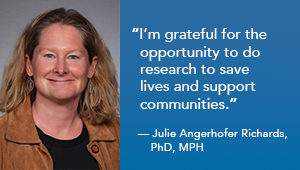Julie Richards, PhD, MPH
Biography
Julie Angerhofer, PhD, MPH, is passionate about improving care for mental health and substance use in partnership with people who provide and receive health care. She applies qualitative methods to inform what research questions we should be asking and how we should consider answering them. She employs statistical methods to inform implementation evaluations with a goal of optimizing care delivery and improving clinical practice effectiveness and patient outcomes.
Dr. Richards recently received grants from the Centers for Disease Control and Prevention and the American Foundation for Suicide Prevention to research firearm suicide prevention in health care systems via user-centered design and community-based participatory research. She also collaborates with multidisciplinary teams on a variety of mental health and addiction research projects, supports care delivery research partnerships, and mentors students at the University of Washington as an affiliate assistant professor.
Research interests and experience
-
Suicide Prevention
-
Alcohol and Drug Use
-
Behavior Change
Firearm injury prevention; alcohol and drug misuse; tobacco cessation
-
Mental Health
Depression; alcohol and drug use disorders; suicide prevention; self-management
-
Social Determinants of Health
Stigma
-
Health Services & Economics
Quality improvement, implementation cost
-
Preventive Medicine
Public and population health; screening effectiveness and uptake; evidence-based practice recommendations
-
Implementation Research
-
Addictions
Prevention and treatment
Sparc trial tools
Resources for behavioral health integration
The SPARC trial successfully implemented behavioral health care into primary care. On our website, you can access tools for behavioral health integration, as well as frequently asked questions and publications.
Recent publications
Simon GE, Shortreed SM, Boggs JM, Clarke GN, Rossom RC, Richards JE, Beck A, Ahmedani BK, Coleman KJ, Bhakta B, Stewart CC, Sterling S, Schoenbaum M, Coley RY, Stone M, Mosholder AD, Yaseen ZS. Accuracy of ICD-10-CM encounter diagnoses from health records for identifying self-harm events. J Am Med Inform Assoc. 2022 Aug 26:ocac144. doi: 10.1093/jamia/ocac144. [Epub ahead of print]. PubMed
Yarborough BJH, Stumbo SP, Schneider JL, Richards JE, Hooker SA, Rossom RC. Patient expectations of and experiences with a suicide risk identification algorithm in clinical practice. BMC Psychiatry. 2022 Jul 23;22(1):494. doi: 10.1186/s12888-022-04129-1. PubMed
Frost MC, Matson TE, Richards JE, Lee AK, Achtmeyer CE, Bradley KA, Williams EC. Barriers and facilitators to changing drinking and receiving alcohol-related care: interviews with Veterans Health Administration primary care patients who indicated interest but did not enroll in an alcohol care management intervention trial. Subst Abus. 2022;43(1):1197-1206. doi: 10.1080/08897077.2022.2074602. PubMed
Simon GE, Richards JE, Boggs JM. Effect of care management or online dialectical behavior therapy skills training vs usual care on self-harm among adults with suicidal ideation-reply. JAMA. 2022 Jun 14;327(22):2246-2247. doi: 10.1001/jama.2022.5883. PubMed
Frost MC, Richards JE, Blosnich JR, Hawkins EJ, Tsui JI, Edelman EJ, Williams EC. Association between clinically recognized suicidality and subsequent initiation or continuation of medications for opioid use disorder. Drug Alcohol Depend. 2022 Aug 1;237:109521. doi: 10.1016/j.drugalcdep.2022.109521. Epub 2022 Jun 3. PubMed
Research

Suicide attempts decreased after adding suicide care to primary care
Safety planning and risk screening improved outcomes for adult patients.
Research

Understanding adoption of Lock to Live, a decision aid supporting suicide prevention
KPWHRI research finds ways to increase use of a firearm safety tool.
News

Kaiser Permanente expands gun violence prevention work
Equity-focused research by Julie Angerhofer Richards, PhD, MPH, is among the work supported by $3.2 million.
KPWHRI in the media
Suicide care in primary care reduces suicide attempts
Primary care intervention might reduce suicide attempts
MedPage Today, Sept. 30, 2024



